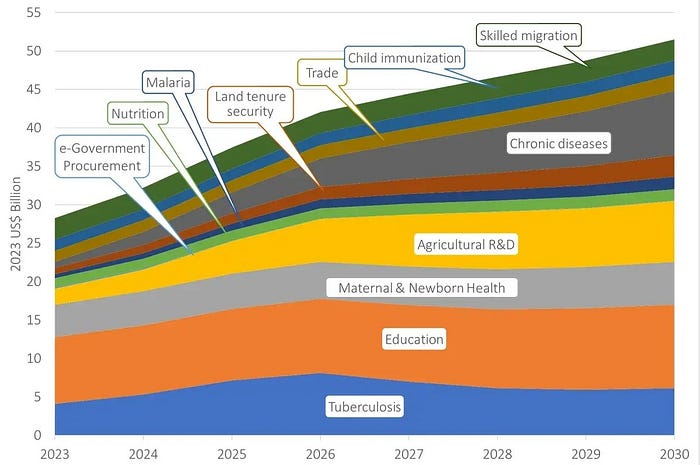What if We All Showed Up for a Climate Disaster That Didn’t Happen?

Greetings friends!
If the world was coming to an end because of climate change, you’d expect there to be some impact on GDP growth, right?
After all, the destruction of the planet and the death of everyone on it by fires, flooding, and superstorms seems like it would create a little damage to the bottom line along the way.
Hold that thought.
Because he cares, President Biden signed an executive order on Climate-Related Financial Risk that directed work across the Federal Government to create “consistent, clear, intelligible, comparable, and accurate disclosure of climate-related financial risk.”
That was in 2021, and this year two agencies (the Council of Economic Advisers and the Office of Management and Budget) released a honking big white paper discussing the impact of climate change on U.S. finances.
It’s a thorough study.
They discuss what might happen with GDP growth and it is eye-opening:

As the Wall Street Journal sums up this conclusion: “In other words, if the average annual GDP growth rate is 1.5% for the next 80 years, the economy would grow 232%. A 2% climate-change effect would reduce the growth to 225%.”
Quickly, kill all the children to prevent some kind of disaster!
“Well, don’t get snarky, James. What about the debt-to-GDP ratio? Maybe the looming crisis reveals itself there.”
All right. Here’s how that looks:

Here, I think we’ll let the white paper authors speak for themselves on the truly staggering impact of global warming on our debt:
Debt to GDP under the low global emissions scenario is projected to reach 111.2 percent by 2048, compared to 110.0 percent in the policy baseline. The debt-to-GDP ratio is projected to be even higher under the middle and high global emissions scenarios, reaching 111.9 percent and 112.6 percent, respectively, by 2048.
Quickly, kill all the people who eat meat! And kill the cows, too, to prevent the polar bears from causing another Titanic submersible disaster, or something.
If you think it’s no big deal for the world to spend $632 billion a year on its way to spending anywhere from $1 to $4 trillion a year on climate change, you’re probably just fine with child sacrifice.
“Wait, what?! That’s not what we want. And why shouldn’t we spend any amount if the risk is the total destruction of the species?”
First, if even Biden’s own minions can barely find a financial impact despite some serious looking, you might want to question the basic premise that the sky is falling.
Second, to achieve an almost imperceptible impact on potential warming, the unprecedented amounts we spend on Tesla subsidies and lithium mining cannot be spent elsewhere.
This is a real problem. Why is that, you ask?
If we really want to do good in the world…
We must consider where the world’s resources are best spent. That’s because no one wants to waste money.
For just $41 billion a year (just 1% of what environmentalists demand we must spend on climate change), we could save some 4 million lives a year, and generate more than a trillion dollars in additional benefits.

Don’t take my word for it. This comes from a bevy of economists and Nobel Prize winners who spent years evaluating where the world gets the best return on its investment.
See the Copenhagen Consensus for more details.
Or if all this is hurting your head…
You could just silence everyone who dares disagree with you.
Bonus points for taking out meat eaters.
But I could be wrong. I’d appreciate your telling me if you think so.
Be well.
Hit reply to tell me what's on your mind or write a comment directly on Klugne. If you received this mail from a friend and would like to subscribe to my free weekly newsletter, click here.
I published a version of this article on Medium originally.






Member discussion